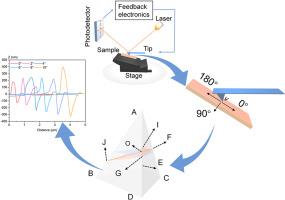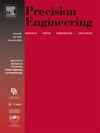Modeling and experimental investigation of the effect of sample tilt on the machining performance in AFM-based nanofabrication
IF 3.7
2区 工程技术
Q2 ENGINEERING, MANUFACTURING
Precision Engineering-Journal of the International Societies for Precision Engineering and Nanotechnology
Pub Date : 2025-07-16
DOI:10.1016/j.precisioneng.2025.07.012
引用次数: 0
Abstract
Atomic force microscope (AFM)-based nanoscale machining has been proven to be an effective method for fabricating nanostructures. Through a combination of theoretical analysis and experimental investigation, the impact of sample tilt on the performance of AFM-based nanoscale machining is systematically examined. Three typical scratching directions, along the cantilever axis, perpendicular to the cantilever axis, and away from the cantilever axis, are considered in this study. Theoretical models are developed for each of these directions, and experimental validation is conducted. The results demonstrate that sample tilt has a significant impact on machining outcomes, primarily attributed to variations in the force applied by the AFM tip and the load-bearing area. These factors are influenced by both the tilt angle and the scratching direction. Experimental tests reveal that the developed models can precisely predict the impact of sample tilt on machining outcomes. Furthermore, this study investigates the relationship between machining depth and load for the three scratching directions under tilted sample conditions. Finally, we explored the impact of the friction coefficient and probe geometry on the machining results. This research provides robust theoretical support for comprehending the influence of sample tilt on AFM-based nanoscale machining and offers significant insights into optimizing the machining process.

基于afm的纳米加工中样品倾斜对加工性能影响的建模和实验研究
基于原子力显微镜(AFM)的纳米加工已被证明是制造纳米结构的有效方法。通过理论分析和实验研究相结合的方法,系统地研究了样品倾斜对原子力显微镜纳米加工性能的影响。本研究考虑了沿悬臂轴方向、垂直于悬臂轴方向和远离悬臂轴方向三种典型的刮擦方向。针对这些方向分别建立了理论模型,并进行了实验验证。结果表明,样品倾斜对加工结果有显著影响,主要归因于AFM尖端和承载区域施加的力的变化。这些因素受刮削方向和刮削角度的影响。实验结果表明,所建立的模型能较准确地预测试样倾斜对加工结果的影响。此外,本文还研究了倾斜试样条件下三种方向的切削深度与载荷之间的关系。最后,探讨了摩擦系数和探头几何形状对加工结果的影响。该研究为理解样品倾斜对基于afm的纳米加工的影响提供了强有力的理论支持,并为优化加工工艺提供了重要的见解。
本文章由计算机程序翻译,如有差异,请以英文原文为准。
求助全文
约1分钟内获得全文
求助全文
来源期刊
CiteScore
7.40
自引率
5.60%
发文量
177
审稿时长
46 days
期刊介绍:
Precision Engineering - Journal of the International Societies for Precision Engineering and Nanotechnology is devoted to the multidisciplinary study and practice of high accuracy engineering, metrology, and manufacturing. The journal takes an integrated approach to all subjects related to research, design, manufacture, performance validation, and application of high precision machines, instruments, and components, including fundamental and applied research and development in manufacturing processes, fabrication technology, and advanced measurement science. The scope includes precision-engineered systems and supporting metrology over the full range of length scales, from atom-based nanotechnology and advanced lithographic technology to large-scale systems, including optical and radio telescopes and macrometrology.

 求助内容:
求助内容: 应助结果提醒方式:
应助结果提醒方式:


